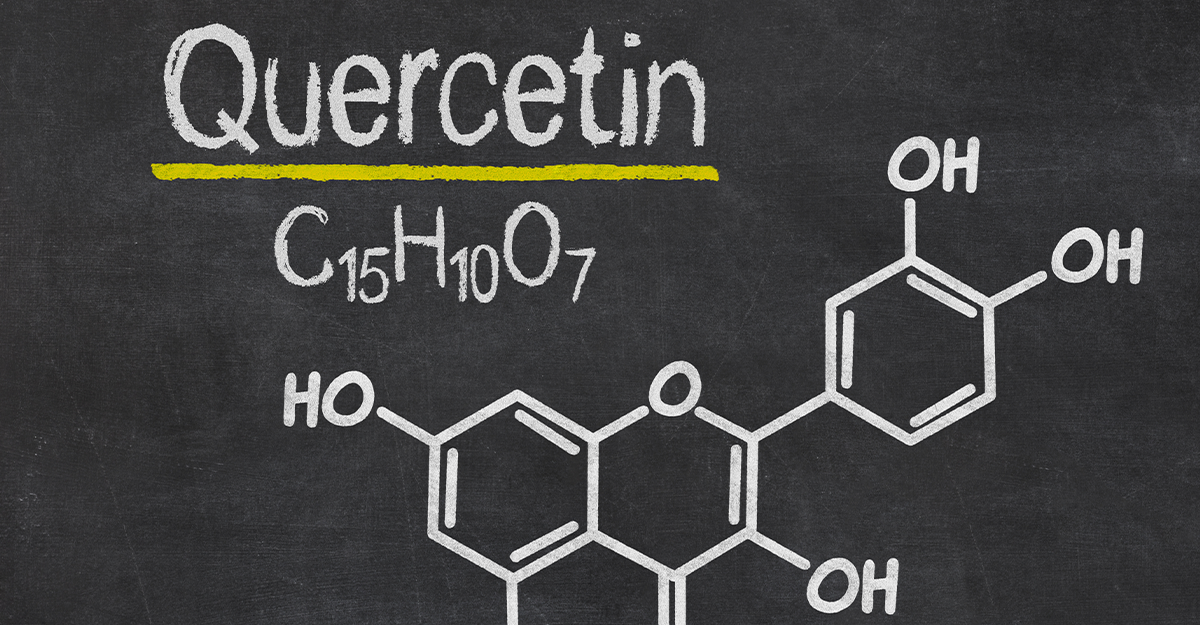
What is Quercetin Used For?
Quercetin is a powerful and popular supplement for various health conditions, including allergies, respiratory infections, and brain health. In today’s article, learn more about this bioactive compound, what it’s used for, and how to get the most from your quercetin supplement.
We’ll cover:
- What is quercetin?
- What is quercetin used for? (Health benefits of quercetin)
- Quercetin supplementation
What is Quercetin?
Quercetin is a type of polyphenol, bioactive compounds in plants that help them survive in the environment. Specifically, quercetin is a flavanol, one of the most studied bioflavonoids. (Source 1)
Quercetin is abundant in nature and whole plant foods. Onions contain the highest concentration of quercetin in the human diet. Other dietary sources of quercetin include:
- Grapes
- Berries
- Cherries
- Broccoli
- Citrus fruits
- Apples
- Capers
- Buckwheat
- Green leafy vegetables
- Tea (Source 1)
Quercetin is also found in herbal remedies, such as elderberry and ginkgo. (Source 2)
A diet rich in polyphenols, including quercetin, promotes health. (Source 2)
“A diet rich in polyphenols, including quercetin, promotes health.”
What is Quercetin Used For?
The health benefits of quercetin are far-reaching. Beneficial actions of quercetin in the body include:
- Antioxidant properties
- Anti-inflammatory
- Anti-cancer
- Anti-hypertensive (lowers blood pressure)
- Anti-diabetic
- Antihistamine
- Anti-microbial
- Neuroprotectant (Source 1, 2)
Let’s look at some of the specific health benefits of quercetin:
Anti-aging
With aging comes an increase in oxidative stress and free radical damage to cells. The body requires increased antioxidant protection, and dietary or supplemental polyphenols help fill the gap.
Quercetin is an antioxidant and increases other antioxidants, including glutathione. Additionally, polyphenols are anti-inflammatory by inhibiting a primary inflammatory pathway called NF-kB. (Source 2)
Lowers disease risk
Because of the powerful antioxidant, anti-inflammatory, and anti-aging properties of quercetin, quercetin and other polyphenols may help* to lower the risk of age-related chronic diseases, including:
- Type 2 diabetes
- Cardiovascular disease
- Neurodegenerative diseases, including Alzheimer’s disease
- Cancer (Source 2)
Immune support
Quercetin has antibacterial and antiviral characteristics and may be a helpful supplement for respiratory and other infections. Quercetin also acts as an antihistamine to block histamine release from mast cells. Because of the antihistamine properties, quercetin supplementation may be helpful for allergies, asthma, hay fever, and hives. (Source 2)
As an at-home supportive therapy for Covid-19, researchers have tested quercetin in several trials. A compilation of data suggests quercetin helps prevent the risk of intensive-care admission and hospitalization in patients. (Source 3)
Quercetin Supplements, Dosages, and Absorption
Quercetin supplements are recommended for various health benefits and are safe in doses of up to 1 to 2 grams daily. However, the primary downside of quercetin supplements is its poor solubility and absorption. (Source 4, 5)
“The primary downside of quercetin supplements is its poor solubility and absorption.”
However, absorption can be significantly increased with a liposomal delivery system, as you’ll find in Core Med Science Liposomal Quercetin. A liposome mimics the phospholipid membrane of human cells, allowing for improved absorption and bioavailability, even in those with compromised gut health. Learn more about the different forms of liposomal formulas here.
Research suggests that liposomal quercetin supplements increase quercetin levels in the blood by up to 20 times more than traditional supplements! (Source 5)
“Research suggests that liposomal quercetin supplements increase quercetin levels in the blood by up to 20 times more than traditional supplements!”
Core Med Science Liposomal Quercetin is sourced from the flowers of the Japanese pagoda tree, manufactured in the United States, and free of common allergens (including soy) and GMOs. Each dose contains 200 mg of highly absorbable quercetin.
Quercetin has a wide range of uses. Whether you are using it for seasonal allergies, to help you get over a cold, or to boost your body’s antioxidants, be sure to choose a high-quality, liposomal supplement, like Core Med Science Liposomal Quercetin, for optimal results.
“Whether you are using it for seasonal allergies, to help you get over a cold, or to boost your body’s antioxidants, be sure to choose a high quality, liposomal supplement, like Core Med Science, for optimal results.”
The beneficial effects of quercetin and its potential side effects, such as possible allergic reactions, may vary between people, which is why you should discuss using quercetin supplements with your healthcare provider beforehand. Women who are breastfeeding or pregnant should be careful about adding dietary supplements to their health routine.
*More clinical research is needed.
References:
- Anand David, A. V., Arulmoli, R., & Parasuraman, S. (2016). Overviews of Biological Importance of Quercetin: A Bioactive Flavonoid. Pharmacognosy reviews, 10(20), 84–89. Full text: https://www.ncbi.nlm.nih.gov/pmc/articles/PMC5214562/
- Deepika, & Maurya, P. K. (2022). Health Benefits of Quercetin in Age-Related Diseases. Molecules (Basel, Switzerland), 27(8), 2498. Full text: https://www.ncbi.nlm.nih.gov/pmc/articles/PMC9032170/
- Cheema, H. A., Sohail, A., Fatima, A., Shahid, A., Shahzil, M., Ur Rehman, M. E., Awan, R. U., Chinnam, S., & Nashwan, A. J. (2023). Quercetin for the treatment of COVID-19 patients: A systematic review and meta-analysis. Reviews in medical virology, 33(2), e2427. Abstract: https://pubmed.ncbi.nlm.nih.gov/36779438/
- https://examine.com/supplements/quercetin/
- Riva, A., Ronchi, M., Petrangolini, G., Bosisio, S., & Allegrini, P. (2019). Improved Oral Absorption of Quercetin from Quercetin Phytosome®, a New Delivery System Based on Food Grade Lecithin. European journal of drug metabolism and pharmacokinetics, 44(2), 169–177. Full text: https://www.ncbi.nlm.nih.gov/pmc/articles/PMC6418071/
